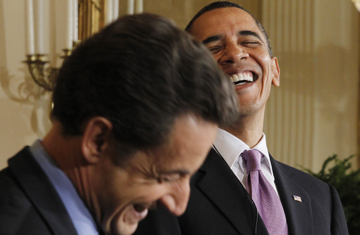
U.S. President Barack Obama and French President Nicolas Sarkozy share a laugh during a joint news conference at the White House in March 2010
When then Senator Barack Obama visited Paris during his pre-election tour of Europe in July 2008, he received a remarkable gift from French President Nicolas Sarkozy: as close to a glowing endorsement that any candidate for the White House could ever hope for from a foreign head of state. "I wish Barack Obama luck — if it's him [who wins], France will be very happy," Sarkozy told a horde of reporters in the Elysée as the U.S. presidential candidate looked on. But that conspicuously warm initial embrace was not the start of a beautiful friendship. Instead, the leaders' clashing personalities and management styles have at times overshadowed the reality that their international policy objectives are usually similar, when not identical. During their Jan. 10 meeting in Washington, however, Obama and Sarkozy will team up to focus on mutual objectives to strengthen the global economy in the hopes that they can improve something else that's common to them both — the particularly glum political perspectives at home.
Monday's visit will be Sarkozy's second to Washington in less than a year, and talks will largely center on his agenda for France's presidency of the G-20 and G-8 this year. Sarkozy's goals in that role are ones both men can get behind: to take steps within the G-20 to bolster global economic growth and to spark the kind of surge in job creation that would lift both Presidents' standings with increasingly unhappy voters. But the rest of Sarkozy's initiatives may be tougher for Obama to love. The French leader wants to revise the international monetary system — ending the dollar's status as the sole reserve and linking the currency to a fixed set value — as well as regulate commodity markets to battle their volatility and improve the methods of global governance. Sarkozy may also resume his earlier efforts to usher in the regulation and possible taxation of the world's finance markets — with greater control of hedge funds in particular.
Those aren't calls any U.S. President would be thrilled to hear, and certainly aren't ones Obama can take to the resurgent Republican majority in the House as a Sarkozy goal he's committed to. Yet whereas in the past, conflicting details in their thinking on economic-stimulus action, financial-market regulation or fighting global warming have obscured the generally shared positions of both leaders on such issues, this time Obama and Sarkozy may be more inclined to home in on what they do agree on — namely finding measures all G-20 nations can take to boost growth and job creation. Why the change in attitude? Both Presidents have suffered resounding electoral defeats in the past year, are now struggling with slumping approval ratings and face 2012 re-election bids that will primarily rely on whether they improve employment outlooks at home.
"I think major setbacks both men have suffered — shellackings or otherwise — have made them less confident, less worried about their image and far more concerned with finding effective solutions to problems than sounding good while proposing them," says Nicole Bacharan, a political analyst who specializes in French-U.S. relations. "These are two bowed but intelligent men who see that a lot of progress can be made rapidly at the G-20 level, and know the best way of that happening within the wider group is finding proposals and objectives they can accept together first."
If so, that pragmatism has trumped the somewhat tormented long-distance relationship Sarkozy and Obama have had over the past two years. In the wake of his quasi endorsement of Obama during their 2008 Paris meeting, Sarkozy's desire to become the new President's main international partner — and, indeed, personal friend — was palpable. Consequently, the famously passionate and emotive Frenchman responded to Obama's reserved personality almost as an affront and grew envious of the American's rock-star popularity. That eventually led to the swipes Sarkozy reportedly took at Obama, saying he was too naive and inexperienced for his job, and calling him a "cold fish" whom an adoring world believed "can walk on water." Though the White House never responded, media reports have suggested that members of the Obama Administration viewed Sarkozy not only as an important partner but also one who's loose-lipped and unable to control his ego. Recently published WikiLeaks cables show that U.S. diplomats have felt similarly, describing Sarkozy as a "thin-skinned, authoritarian" man who rules with "monarch-like impunity."
Declines in both men's political fortunes seem to have changed things. In stark contrast to the remarkable media hype surrounding Sarkozy's visit last March, his Jan. 10 meeting with Obama has been downplayed — and tacked to the end of his swing through Martinique and Guadeloupe. And whereas in March, the Elysée trumpeted the unprecedented private diner a quatre to which the Obamas had invited their dear friends, the Sarkozys, this time it took a White House leak for the public to learn that the two First Ladies would be lunching together while their husbands talked shop. In other words, Monday's visit will be all business.
"Though Obama never viewed international meetings as the way to shine to his domestic public the way Sarkozy has, I think both now feel they have more margin for maneuvering to get things done internationally than at home," says Bacharan, who adds that it may lead them to put more energy into instigating change via the G-20 than they usually would. "Not grandstanding or theatrics, but finding ways to get the economy growing and producing new jobs so they can keep theirs in 2012."
